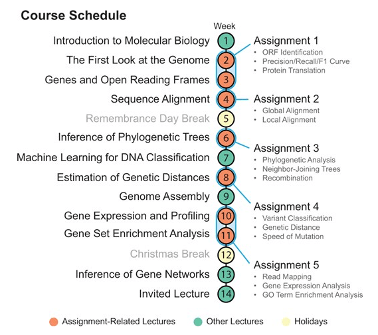Bioinformatics Tutor Can Be Fun For Everyone
Bioinformatics Tutor Can Be Fun For Everyone
Blog Article
Little Known Facts About Bioinformatics Tutor.
Table of ContentsThe 7-Minute Rule for Bioinformatics TutorWhat Does Bioinformatics Tutor Mean?The Buzz on Bioinformatics TutorThe Ultimate Guide To Bioinformatics TutorThe 20-Second Trick For Bioinformatics Tutor
Of the total amount individuals entailed in the training, 80% were students from public college institutions, while the staying 20% originated from personal institutions. To get a certification of involvement, students were called for to participate in at the very least 90% of the complete training hours. As a result of this demand, an impressive 95% of the participants effectively gotten their certifications, having not just met the minimum attendance standards however additionally completed all assigned tasks throughout the training.
During the height of the COVID-19 pandemic, particularly in between June and August 2020, the project team was entrusted with arranging specialized training in bioinformatics. This training was especially intended at students from the research study team Core for Research in Applied Computer at the Federal College of Pará (UFRA) The adjustment to remote knowing systems as a result of the pandemic produced an opportunity to discover new training methods and digital tools that boosted both reach and effectiveness.
This training course was created to give an easily accessible yet comprehensive overview of Artificial Intelligence strategies, particularly as used in bioinformatics (Bioinformatics Tutor). This digital style made it possible for engagement from trainees throughout Brazil, many of whom might not have had the opportunity to participate in in-person sessions.
Bioinformatics Tutor for Dummies
Approximately 50% of the total training hours were dedicated to sensible tasks where pupils built smart versions and applications in a range of clinical domain names, including genetics, molecular biology, and environmental information analysis. These platforms allowed pupils to engage in real-time data manipulation, model training, and formula trial and error.
The training course attracted 80 participants in total. Sixty of them were affiliated with various college organizations in the state of Pará, while the remaining twenty came from establishments found in 5 various other Brazilian states. This broad geographical representation highlighted the nationwide rate of interest in bioinformatics and the growing demand for specialized abilities in this field. By introducing Expert system in a appropriate and sensible context, the effort offered to bridge the gap between theory and real-world application, giving pupils with a solid foundation for future research or employment in the area.
The training effort created component of a wider scholastic outreach initiative recognized as the Bioinformatics when traveling project. This job has, over the years, introduced loads of trainees to the globe of bioinformatics and computational biology. The occasions held under this umbrella initiative have occurred across several areas and years, as summarized in Table 1 (Listing of occasions, areas, years, and total varieties of students and instructors)
Numerous of these teams, at first brought together by their participation in training occasions, have actually given that gone on to produce independent clinical research in collaboration with local academic establishments. The training not just cultivated clinical thinking within the context of bioinformatics yet likewise sparked collective relationships that extended past the training atmosphere.
Get This Report about Bioinformatics Tutor
The exact same group, leaving out IH and RR, also acted as tutors for the functional training modules. Funding for the project was supplied with the give 88887.200562/ 2018-00 from CAPES.
The like it Federal University of Pará's Office of Research study (PROPESP/UFPA) also gave financial backing, specifically for the production of the last manuscript. The authors state no economic or business disputes of rate of interest that could have influenced the research study. Additionally, all interpretations and viewpoints revealed in this post are entirely those of the authors and do not always mirror those of their corresponding organizations, the author, editors, or customers associated with the publication process.

Bioinformatics Tutor Fundamentals Explained
From an instructional point of view, the teaching method made use of in the training was deliberately interactive. Classes were performed in a manner that urged pupil involvement and conversation, surpassing rote memorization to check out exactly how concepts are established, applied in daily life, and checked in scholastic settings. The instructional philosophy focused on nurturing both strong and battling pupils, providing personalized assistance, and building self-confidence through continual mentorship and persistence.

Each team, containing roughly 36 individuals, was sustained by three advisors-- a lot of whom were postdoctoral scientists with specialized competence. These mentors not only assisted make the team projects however likewise facilitated their implementation, making sure that each research concern was both appropriately tough and pertinent. The goal was to provide a naturally reasonable context that participants might explore through flexible objectives and accessibility to curated datasets.
For added understandings into the method and end results of this project-based discovering technique, visitors are guided to S1 Text, which includes thorough summaries of the check my site instructional framework, evaluation approaches, and project themes utilized in the training sessions.
The smart Trick of Bioinformatics Tutor That Nobody is Discussing
Of the total amount participants entailed in the training, 80% were check these guys out pupils from public higher education institutions, while the remaining 20% came from private organizations. To certify for a certificate of involvement, trainees were required to attend at least 90% of the overall training hours. Notably, past the trainees who signed up in the training sessions, seven skilled instructors participated in supplying the programs, while three specialized research study teachers worked with the overall training process. About 50% of the complete training hours were committed to useful tasks where pupils constructed smart versions and applications in a variety of clinical domains, including genes, molecular biology, and environmental information analysis. The training not only promoted clinical reasoning within the context of bioinformatics but additionally sparked joint partnerships that extended beyond the training environment.
Report this page